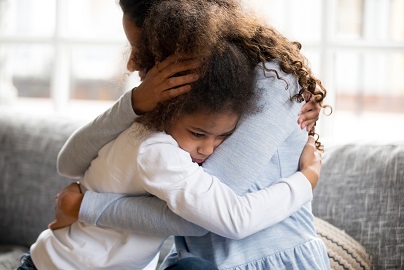Are your children curious about COVID-19? Maybe they heard the word Coronavirus at school or on TV. During this uncertain time, your children might have questions and will turn to you for support. It can be challenging to answer them, especially when you (as the parent) are trying to make sense of the situation yourself. This is a difficult period for all of us, and just like the adults, children might feel anxious, scared and confused.
To get the conversation started, the Substance Abuse and Mental Health Administration has provided the following helpful information. You will find a list of common reactions, helpful tips for parents and caregivers, and talking points based on your child’s age.
How Parents, Caregivers, and Teachers Can Support Children in Managing Their Responses to Infectious Disease Outbreaks
With the right support from the adults around them, children and youth can manage their stress in response to infectious disease outbreaks and take steps to keep themselves emotionally and physically healthy. The most important ways to help are to make sure children feel connected, cared about, and loved.
Pay attention and be a good listener: Parents, teachers, and other caregivers can help children express their emotions through conversation, writing, drawing, playing, and singing. Most children want to talk about things that make them anxious and cause them stress—so let them. Accept their feelings and tell them it is okay to feel sad, upset, or stressed. Crying is often a way to relieve stress and grief.
Allow them to ask questions: Ask your teens what they know about the outbreak. What are they hearing in school or seeing on TV? Try to watch news coverage on TV or the Internet with them. Also, limit access so they have time away from reminders about the outbreak. Don’t let talking about the outbreak take over the family or classroom discussion for long periods of time.
Encourage positive activities: Adults can help children and youth see the good that can come out of an outbreak. Heroic actions, families and friends who travel to assist with the response to the outbreak, and people who take steps to prevent the spread of all types of illness, such as hand washing, are examples. Children may better cope with an outbreak by helping others. They can write caring letters to those who have been sick or lost family members to illness; they can organize a drive to collect needed medical supplies to send to affected areas.
Model self-care, set routines, eat healthy meals, get enough sleep, exercise, and take deep breaths to handle stress: Adults can show children and youth how to take care of themselves. If you are in good physical and emotional health, you are more likely to be readily available to support the children you care about.
Tips for Talking With Children and Youth of Different Age Groups During an Infectious Disease Outbreak
PRESCHOOL CHILDREN, 0–5 YEARS OLD
Give these very young children a lot of emotional and verbal support:
- Get down to their eye level and speak in a calm, gentle voice using words they can understand.
- Tell them that you always care for them and will continue to take care of them so they feel safe.
- Keep normal routines, such as eating dinner together and having a consistent bedtime.
EARLY CHILDHOOD TO ADOLESCENCE, 6– 19 YEARS OLD
Nurture children and youth in this age group:
- Ask your child or the children in your care what worries them and what might help them cope.
- Offer comfort with gentle words or just being present with them.
- Spend more time with the children than usual, even for a short while.
- If your child is very distressed, excuse him or her from chores for a day or two.
- Encourage children to have quiet time or to express their feelings through writing or art.
- Encourage children to participate in recreational activities so they can move around and play with others.
- Address your own anxiety and stress in a healthy way.
- Let children know that you care about them— spend time doing something special; make sure to check on them in a nonintrusive way.
- Maintain consistent routines, such as completing homework and playing games together.
Click here to review the entire document provided by Substance Abuse and Mental Health Services Administrator, you can also visit their website for additional information.
Is your child into comic books?
If so, check out Just For Kids: A Comic Exploring The New Coronavirus, published by NPR. We love this tip because we know some children process difficult topics through art and reading.
A NOTE OF CAUTION! Be careful not to pressure children to talk about an outbreak or join in expressive activities. While most children will easily talk about the outbreak, some may become frightened. Some may even feel more anxiety and stress if they talk about it, listen to others talk about it, or look at artwork related to the outbreak. Allow children to remove themselves from these activities, and monitor them for signs of distress.

